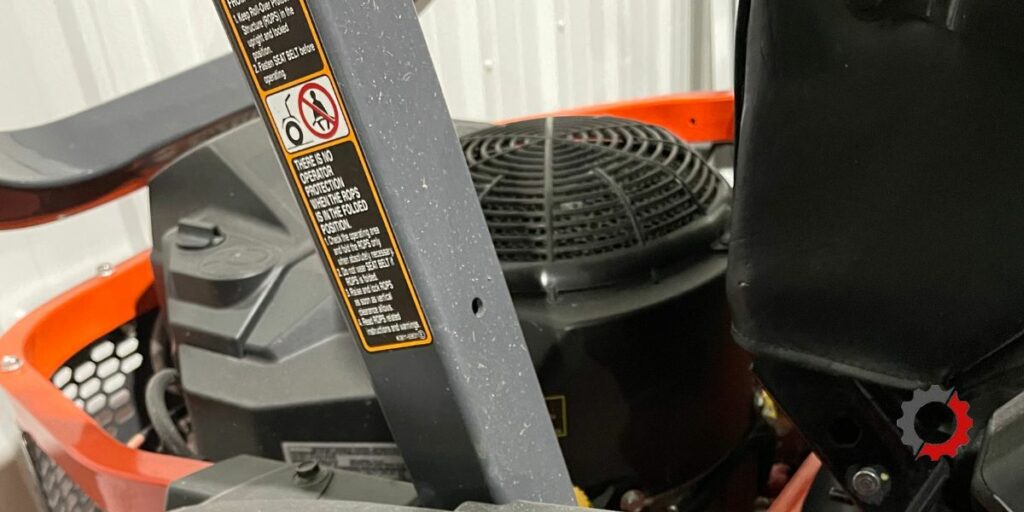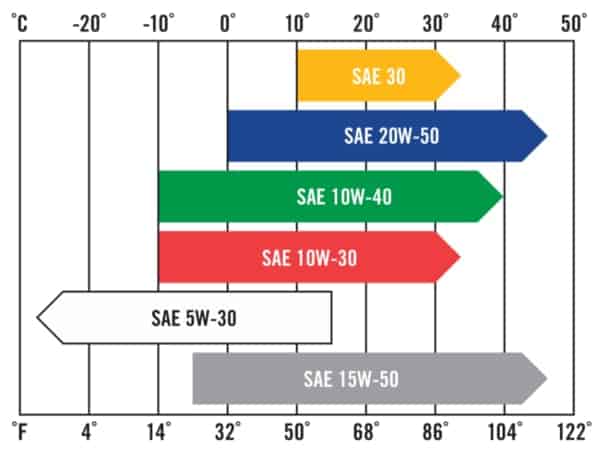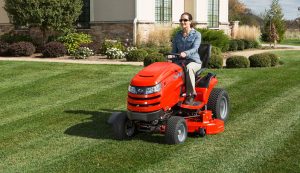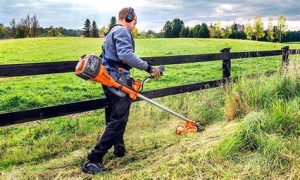Eight Causes of Excessive Engine Heat in a Kubota Lawnmower
If you see your mower emitting a burning odor or smoke, you should immediately stop using it and investigate the problem.
Lack of engine oil, the incorrect oil type, a clogged air filter, blocked cooling fins, or a missing engine guard are all potential causes of engine overheating in a Kubota lawn mower.
Overheating may also be caused by operating the Kubota too rapidly for long, thick, or damp grass, or by using a clogged mower deck or dull mower blades.
Please observe all of the security measures outlined in your Kubota’s handbook. Before making any repairs, you should turn off the mower, take out the key, let the engine cool completely, and then remove the spark plug boots.

Table of Contents
Why Does Your Kubota Mower Get So Hot?
1. A gas-powered Kubota mower with the incorrect engine oil
A gas-powered Kubota benefits from engine oil’s cooling properties. There is a difference in motor oils. When compared to a liquid-cooled engine, the one utilized in an air-cooled tiny engine has very specific oil needs.
Kubota riding mowers and zero-turn mowers with gas-powered tiny Kohler, Briggs & Stratton, or Kawasaki engines run on air-cooled engine oil with a high concentration of zinc. The addition zinc functions as a refrigerant.
Because water in liquid form is required to cool the engine, standard motor oil, such as that used in a vehicle, does not contain much zinc.
Check out the temperature ranges below to see what kind of oil performs best. Use this table in conjunction with the operator’s handbook to determine the ideal oil for your vehicle, since the manufacturer’s suggestions may differ from those listed below.
Typically, SAE30 or 10W-30 engine oil is recommended for use in the tiny engines used in Kubota mowers. However, while working in warmer temps, you may need to switch to 20W-50 oil.
SOLUTION: Remove the old oil and replace it with the proper air-cooled oil.

2.Kubota Lawnmower with Low Engine Oil
To ensure smooth motion of the engine’s internal components, regular lubrication is essential. Low oil levels cause friction, which in turn causes the engine to overheat.
If you keep an engine running with a low oil level, the oil will thicken. This is a certain way to wreck an engine.
Before you start the mower, you should make sure the engine oil is at the proper level. If the oil level is low, you should top it off.
If the oil level in your Kubota mower is always low, check for the following.
- Oil Leak – Check for engine oil leaks by inspecting the whole engine compartment. Once the source of the leak has been located, the leaking gaskets must be replaced.
If your mower has a filter, you should check that as well. Verify the integrity of the oil filter’s seal. - Burning Oil – See whether the air filter is clogged. If the air filter is clogged, the engine will have to work harder to prevent the oil from burning. If the filter becomes too filthy to clean, you should replace it.
- Using Oil – Overheating during usage may cause an engine to consume oil. It may also point to an issue with the valves or rings. Take your mower in for an engine checkup as soon as possible.
SOLUTION: If the engine oil level seems low, fill it up. If you suspect dirty oil as the source of your engine’s unpleasant odor, a comprehensive oil change is the best course of action. Perhaps the oil thickened while it was heated.
Even after an oil change, your Kubota may have been severely damaged by operating with insufficient oil.
If you need help fixing your lawnmower, visit a Kubota dealer or a dealer specializing in engines. To fully assess the situation, the technician will need to do further tests.
3. Kubota Mower Engine Overheats Due to Broken or Clogged Cooling Fins
To keep the cylinder head and engine block cold, the engine cooling fins direct air to the outside of the vehicle.
- There is a fan mounted on the top of the engine. New, cold air is sucked in and pushed downwards toward the engine.
- Heated air is evacuated from the bottom of the engine after being routed through all of its heated components.
A failure to flow enough air around the engine might occur if the cooling fins get clogged with dirt or are broken. The engine may overheat as a result of this.
SOLUTION: Take off the top of the engine and clean the radiator fins. You need to repair any broken fins you locate. Get rid of the grime on the engine cover and around the area.
From now on, you should schedule this checkup every year.
When you wash the engine of your Kubota, water and grime are pushed deeper into the engine, making the situation worse. Avoid making a bad situation more worse by spraying water into the engine when cleaning your lawn mower.
4. The Kubota mower’s engine guard is missing.
To prevent the engine from overheating, the shield must be in place to allow cool air to flow around it. When the watchman isn’t there, the neighborhood loses its calm atmosphere.
SOLUTION: Make sure the engine guard is in the right spot. Make sure the protection is firmly secured by tightening or replacing the screws holding it in place. Substitute a new guard for an old one.
5. Kubota Lawnmower Air Filter Clogged
In order to protect the engine from dirt that may shorten its lifespan, an air filter is installed.
Without regular maintenance, the filter may get so clogged with dirt and debris that it prevents air from reaching the engine.
The Kubota engine may overheat if it needs to work harder to dissipate the heat.
SOLUTION: Take off the filter and check it out. Put some light through the paper part. If the quantity of light is satisfactory and the filter seems to be in excellent condition, you may clean it by tapping it against a hard surface before replacing it.
But if the illumination is poor or nonexistent, the air filter is broken, or it is exceedingly dusty and dark in color, a new filter should be installed.
Inner air filter & pre-filter: The inner air filter is a thin filter used by certain Kubota mower engines. This filter is housed inside a canister-shaped paper air filter. A foam pre-cleaner may be used by some, which is wrapped around a traditional paper air filter.
These filters provide extra defense for the motor by collecting debris and keeping it out of the engine’s air intake system.
Replace and clean the air filter:
To maintain the air filter in excellent condition during the mowing season, I suggest changing it once a year and cleaning it numerous times.
If you use your Kubota in dusty circumstances or if you mow your lawn more often than the typical homeowner, you may need to replace or clean it more frequently.
Don’t be stingy; instead, do everything you can to extend the life of the air filter. Despite my frugal nature, I often shell out cash for necessary upkeep goods.
If debris gets into the engine, I’ll have to spend a lot more money fixing or replacing it than I would on a new air filter.
6. Kubota Lawnmower with a Clogged Deck
Grass clippings, dirt, and other debris may accumulate on your Kubota mower deck and need to be removed on a regular basis.
This accumulation lessens the space beneath the deck, which is utilized to generate air flow for a clean shave. The engine has to work harder to turn the blades as they pass through the dust and dirt.
SOLUTION: Use a deck scraper to clean the mower’s deck. You may also use a putty knife or wire brush.
Maintaining a clean mower deck requires regular inspections.
The underside of the mower deck may be coated with a substance that repels debris and reduces accumulation. They won’t work like a miracle and you’ll still get some buildup, however.
Avoid cutting damp grass and keep your mower running at maximum speed to prevent clumping and accumulation beneath the deck.
7. A Kubota mower with dull blades.
The issue of a clogged mower deck is exacerbated by dull mower blades.
When there’s debris beneath the deck, the engine has to work harder to spin the blades, which might cause it to overheat if the blades are dull to begin with.
SOLUTION: The blades of lawn mowers need to be sharpened and inspected frequently. Mower blades need to be sharpened around every 25 hours or twice a season for the typical household.
If you want to learn more about how to balance and sharpen your Kubota mower’s blades, check out Change & Sharpen Your Kubota Mower Blades.
8. The Kubota Motor Is Being Overworked
To get the most out of your Kubota, it is important to assess the circumstances in which you will be cutting the grass.
Grass that is too long, too thick, or too damp to cut may place a strain on the engine. It might overheat if you do this.
SOLUTION: The ground speed of the mower must be reduced when the grass is long, thick, or damp. If you want to get a good trim without taxing the engine too much, try these strategies.
- Do not attempt to trim damp grass.
- Long grass should be trimmed twice or three times. Mower deck height is increased to its maximum position. Do the first slicing.
- The deck height is then lowered and a second cut is made.
- Mow the lawn quickly, using the accelerator all the way to the floor.
- If you’re trying to mow long, thick, or damp grass, you should go slower.
Let the Kubota Engine Cool Down After Mowing the Lawn
If you’ve been using a Kubota lawnmower, you should let the engine cool down before putting it away.
A Kubota mower should be kept in the open air. If your Kubota riding mower has a concealed engine, you may see it by popping the hood.
Allow the mower to operate at idle. Your engine will start cooling down via regular means.
Read our article “Lawn Mower Engine Cooling Times Explained” to find out more about engine cooling and the elements that effect it.
Is your Kubota Lawnmower Still Giving You Trouble?
As time goes on, you’re certain to have issues with your lawnmower, whether it’s starting, stopping, smoking, leaking gas, cutting poorly, vibrating, or something else entirely.
I’ve compiled this manual to assist you save time and money the next time your Kubota mower breaks down.
Hire a professional to fix your Kubota lawnmower if you don’t feel confident diagnosing and fixing it yourself.
You’ll save yourself from harm and the mower from further destruction by doing this. If you’re having trouble with your lawn mower, go on over to the nearest Kubota dealer or service facility.






